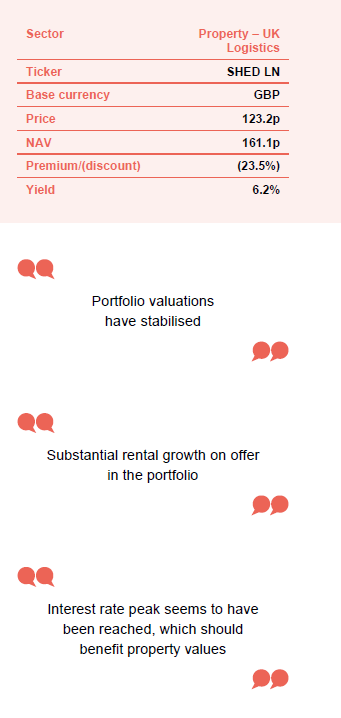Urban Logistics REIT
REITs | Annual overview | 10 January 2024
A re-rating candidate
If an inflexion point in the interest rates cycle has been reached, as seems to be the case, Urban Logistics REIT (SHED) is a compelling proposition. Valuations have stabilised – as evidenced by a 0.2% uplift in the value of SHED’s portfolio in the six months to September 2023 – while the company has substantial reversion baked into its portfolio (reversion is the rental growth potential of the portfolio, being the difference between current portfolio rents and the estimated rental value of the portfolio).
SHED’s manager has an enviable track record of creating value through asset management initiatives. It says that it will continue to be a focus for the company as it builds on the success of recent lease events that resulted in a 10% uplift in rents. Operating in the ‘mid-box’ segment of the logistics sector – where strong rental growth is forecast, and supply and demand characteristics remain favourable – gives it an advantage over both the wider real estate sector and some of its closest peers.
SHED’s current discount to net asset value (NAV) of 23.5% seems both unjustified and highly attractive, especially if the next move in interest rates is down.
‘Last mile’ logistics
SHED invests in a diverse portfolio of single-let, urban logistics properties located in the UK, with the aim of providing its shareholders with a 10% to 15% total return per annum.
At a glance
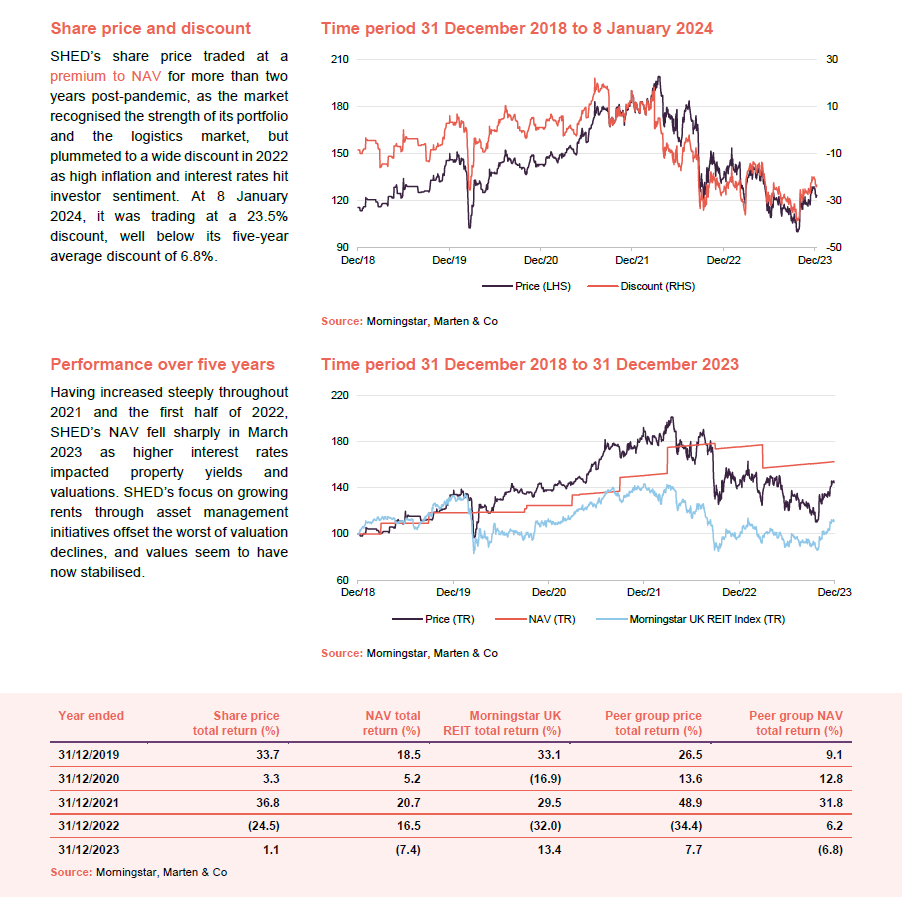
Fund profile
SHED invests in and manages a portfolio of urban logistics assets – defined as smaller single-let warehouses (in the 20,000 sq ft to 200,000 sq ft size range) located close to major conurbations across the UK – which is diversified by tenant. SHED is the only real estate investment trust (REIT) wholly focused on these assets. The strategy aims to capture rental value growth through active asset management initiatives and upward momentum in rents and capital value.
The fund’s website is urbanlogisticsreit.com
Initially, SHED was listed on the AIM market of the London Stock Exchange on 13 April 2016 as Pacific Industrial & Logistics REIT. The group deployed the capital (and debt) from its initial public offering (IPO) into a portfolio of 11 urban logistics property assets across the UK and has since made several successful placings to grow its portfolio. It now has a portfolio of 130 assets, worth £1,104m at 30 September 2023. It changed its name to Urban Logistics REIT on 25 April 2018.
Moved to a premium listing on the London Stock Exchange
SHED’s shares were admitted to trading on the main market of the London Stock Exchange on 7 December 2021. Since then, the company has been a constituent of the FTSE 250 Index. SHED has a conservative capital structure and a measured approach to the use of debt, with a target loan to portfolio value (LTV) of 30% to 40%. At 30 September 2023, the group’s LTV was 29.3%.
New management arrangements
The company’s investment adviser is Logistics Asset Management LLP, which took over from PCP2 Limited (part of the Pacific Investments Group) in May 2023. G10 Capital Limited succeeded PCP2 as the AIFM to the company at the same time. Logistics Asset Management is led by Richard Moffitt as chief executive, who has led the team since the inception of SHED, supported by Christopher Turner as property director, Justin Upton as chief investment officer, and Jamie Waldegrave as chief financial officer. The investment adviser’s appointment was extended for a further three years from 12 May 2024 and may be terminated on one year’s notice from 12 May 2026 onwards.
Richard and the team have considerable sector knowledge and have a long track record of success in logistics and real estate, built up over more than 25 years. The adviser identifies and acquires assets (the majority of which have been sourced off-market, utilising its contacts and reputation in the sector) and implements its asset management strategy to create value for shareholders.
Market outlook
The outlook for the UK real estate sector is looking as positive as it has done for the past 18 months, with encouraging inflation data raising hopes that interest rates have peaked. Headline inflation fell sharply in November to 3.9% from 4.6% in October and 6.7% in September. The Bank of England has held rates at 5.25% for the third consecutive month in December.
Interest rates may have peaked, as inflation continues to fall
Although the annual rate of inflation appears to be on its way down towards the Bank’s 2% target, core inflation (which excludes volatile energy, food, alcohol and tobacco prices) remains elevated at 5.2%, down from 5.7% in October. Wage growth also remains high, which could undo the effects of higher interest rates on inflation and mean higher rates for longer.
Even so, further interest rate hikes appear to no longer be necessary, which could act as a starting point for investor sentiment towards the real estate sector to turn positive again. The performance of real estate is intrinsically linked with interest rates – higher interest rates mean higher property investment yields and lower capital values and vice versa. Now that interest rates have seemingly peaked, a period of price discovery should ensue as assets start trading again in earnest.
Reflecting the high interest rate environment, values across real estate sub-sectors have fallen hugely over the last 20 months, with the logistics sector particularly impacted due to the low investment yields that logistics assets were trading on before the rate rises (prime logistics assets were trading at yields of around 3.25% in early 2022).
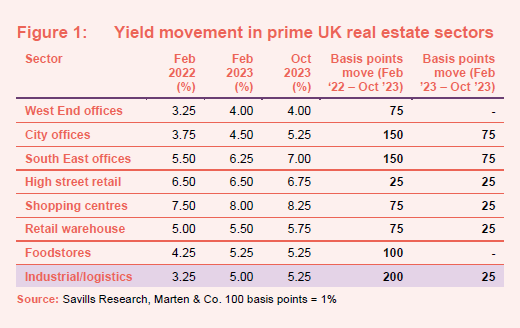
Industrial values have stabilised after large falls at the end of 2022
Figure 1 shows the yield movement of different prime property sectors between February 2022 and October 2023 and illustrates the extent of yield movement in the industrial and logistics sector over the period. MSCI’s index showed that UK industrial property capital values fell by 26% in the second half of 2022, the steepest fall for the sector on record. Since then, values have stabilised and in the three months to 30 September 2023, the MSCI UK Quarterly Property Index recorded a 1.2% return for the industrial sector. This trend has been witnessed in SHED’s portfolio, where values fell 9.8% in the year to 31 March 2023 and stabilised in the six months to 30 September 2023, increasing by 0.2%. SHED’s active asset management approach has somewhat shielded its portfolio from the severe valuation falls witnessed in the wider market (more information on SHED’s asset management capabilities is on page 11).
The real estate fundamentals of the logistics sector, underpinned by the supply and demand imbalance, remain convincing (and even more so in the urban sub-sector) and therefore puts it in a position of strength as the likelihood of further interest rate rises (and therefore property yield movement) fades and the market stabilises. We explore the fundamentals of the logistics sector in the following pages, beginning with the investment market.
Investment market
Investment volumes fallen in 2023, but in line with pre-pandemic levels
Logistics investment volumes in the first three quarters of 2023 reached £4.8bn, according to real estate consultancy Gerald Eve, with a further £1.0bn of deals under offer going into the final three months of the year. The likely annual investment volume of £5.8bn puts 2023 in line with pre-pandemic years, despite the subdued levels of activity.
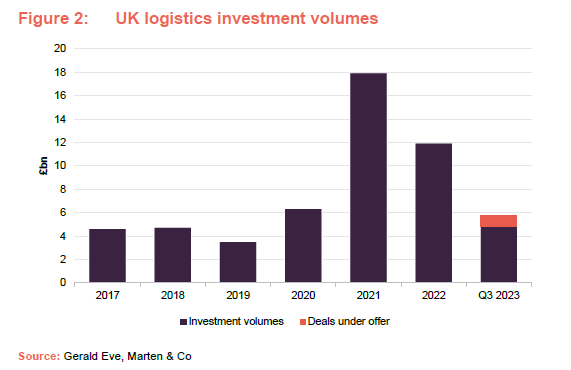
The manager says that transaction volumes started to pick up towards the end of the year and expects greater volumes in 2024. It adds that a significant weight of capital is targeting the sector, with an estimated $345bn of private equity capital raised in 2022 for real estate (with the logistics sector a key focus). Many of the sales this year have been made by UK institutions, with overseas and private equity net purchasers – taking a longer-term view beyond the interest rate volatility.
Assets with rental growth potential, and therefore reversionary yield potential, have been and will continue to be particularly appealing to investors, the manager adds.
Occupier market – supply and demand to remain favourable
Vacancy has crept upwards, but still historically low
The vacancy rate across the industrial and logistics sector (which includes the multi-let, ‘mid-box’ and ‘big-box’ sub-sectors) has risen to around 6.7%. While the vacancy rate in the ‘mid-box’ logistics space, which most accurately reflects the sub-sector that SHED focuses on (being single-let, in the range of 50,000 – 100,000 sq ft), has risen to 4.6%, from around 3.5% a year ago, according to CoStar. Although rising, the vacancy rate is still at historically low levels and back in line with the pre-pandemic rate.
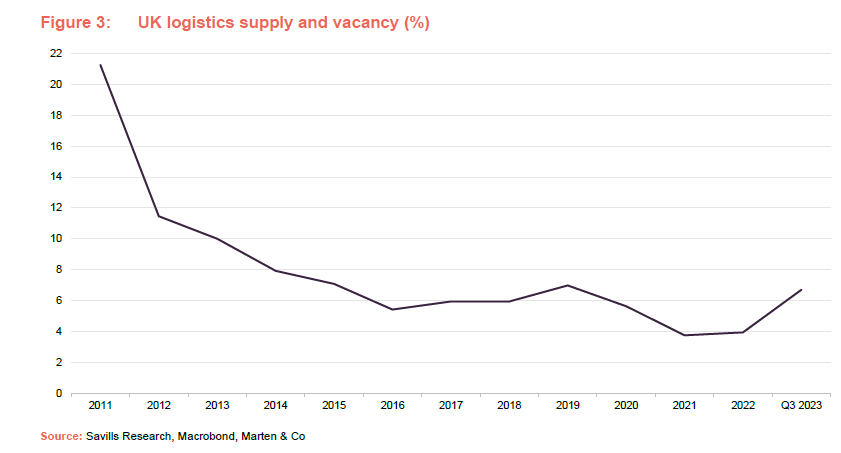
The vacancy rate has been rising due to both a drop in take-up levels and a glut of speculatively developed space (development that is not pre-let to a tenant) that was started in 2021/2022 coming to market. Given the rise in finance costs, developers have re-evaluated planned and previously announced schemes, which means that supply coming into the market from 2024 onwards should be limited – protecting vacancy rates.
Take-up of logistics space was muted in 2023, with the manager expecting the full-year figure to come in at somewhere between 25-30m sq ft, putting it at the lower end of levels seen in the years immediately preceding the pandemic.
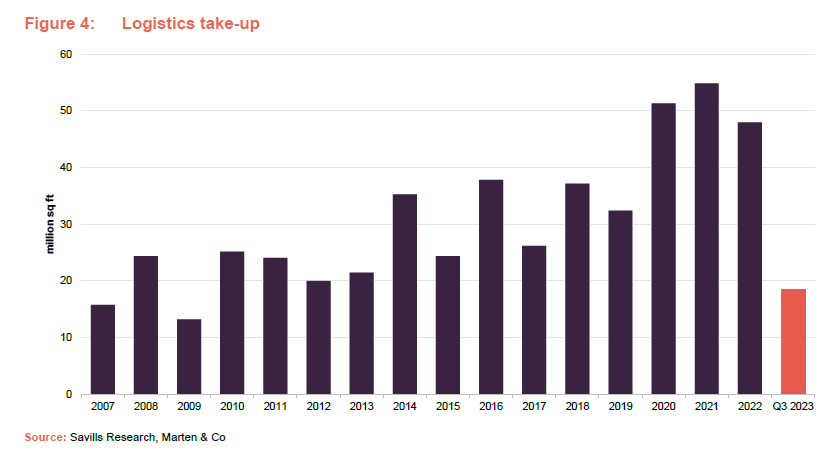
Occupiers have been putting off decision-making where they can and third-party logistics operators (3PLs – such as DHL), which are contract-led, have shifted their leasing strategy from taking space assuming growth to now taking space once contracts have been won. However, they remain an important part of the logistics sector, as Figure 5 shows. 43% of take-up so far this year has been from 3PLs (which make up the majority of SHED’s tenant base – see page 11) at the expense of pure-play online retailers.
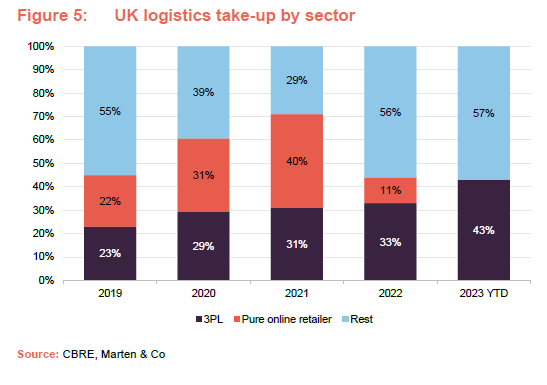
A quiet first half of the year, as occupiers put off decision-making, has been followed by an uptick in leasing enquiries and activity, the manager says. Occupiers are putting a greater emphasis on strong sustainability credentials of buildings and, in a slower market, properties with good energy efficiency ratings have continued to perform well, while less environmentally friendly assets have suffered. For instance, 3PLs must account for good sustainability of the buildings they occupy to win logistics contracts from their sustainability-conscious clients.
As businesses look to prioritise environmental, social and governance (ESG) credentials, the gap between prime and secondary rents has widened to the largest on record. Whilst there has always been a rent spread, this has grown considerably from £1.60 per sq ft in 2007 to £2.40 per sq ft in 2023, an increase of 50%, according to Savills data. At present, average prime and secondary rents sit at £9.32 and £6.95 per sq ft respectively.
Rental growth still apparent
Despite supply rising to its highest level for a decade and take-up reverting back to pre-pandemic norms, rents for prime asset (based on location and quality of building) are continuing to rise. In fact, so far this year, prime rents have increased by 5.8%, compared to just 0.3% for secondary space, according to Savills.
Prime rents up 5.8% in 2023
Using data going back decades, CBRE has found that a vacancy rate of around 8% is the tipping point for when rental growth flatlines – below this level equals rental growth. At 4.6% for ‘mid-box’ logistics (which SHED is focused on) and subdued new supply coming into the market, the outlook for rental growth remains positive. Rental growth forecasts from real estate consultants Savills, Gerald Eve and CoStar are 3.4%, 3.6% and 4.2% annually between 2023 and 2027.
In SHED’s portfolio, new lettings and rent reviews in the six-month period to 30 September 2023 were on average 10% higher than previous levels. Estimated rental values (ERVs) across the portfolio are also still climbing – 1.4% across the portfolio during the period.
Investment process
The company focuses on good real estate in good locations, with limited supply and strong occupational demand. The majority of the company’s portfolio is currently invested in completed, let investments and pre-let income-producing forward-funded developments; however, a proportion may be invested in funding speculative developments, whereby a development scheme has yet to have a tenant signed up. These types of investments allow the group to source higher-quality, lower-priced assets than could be found in the investment market, but it takes on the letting risk.
All acquisitions must satisfy the following criteria:
- Location – good transportation links and workforce availability as well as strong tenant demand and limited supply of appropriate properties;
- Lot size – around £10m-£15m and 20,000 to 150,000 square foot in size, magnifying the results of active asset management;
- Tenancy – a focus on strong tenant covenants (avoiding the fashion sector), with a rating of low/low-moderate risk. Properties with riskier tenant covenants and/or short- to medium-term lease lengths are considered, enabling asset management initiatives to grow tenant covenant strength and lease length; and
- Price – at a level 30% to 70% of replacement cost, creating price resilience.
The majority of SHED’s acquisitions since it launched have been made ‘off market’ (whereby the property is not openly marketed) where vendors sometimes prefer the certainty of the deal and are testament to its manager’s connections within the logistics sector and reputation for swift and certain deal execution. The company can also provide funding to developers (no more than 20% of gross asset value on development activity at any one time) and provide a sale-and-leaseback option to an occupier.
Active asset management
Investments with asset management potential are favoured
SHED likes to add value to an investment and will favour assets that have asset management potential (such as near-term lease events or development opportunities) so it can increase rent and capital values. It will invest in properties where it has the potential to achieve rental growth and outperformance through:
- securing new tenants with stronger financial covenants;
- securing new lease terms focused on duration and rental growth built into the lease; and
- positive geographical characteristics, including age and repair; location; building quality; site cover; transportation links; workforce availability; and internal operational efficiencies.
More detail on SHED’s asset management initiatives is on page 12.
ESG
SHED’s investment process involves the assessment of energy efficiency ratings to ensure properties are sustainable in the long term, while all new developments will have an Energy Performance Certificate (EPC) rating of A and a BREEAM sustainability rating of excellent or very good. The EPC rating across SHED’s portfolio was 55% A-B and 87% A-C at the end of September 2023 (40% and 86% at 30 September 2022).
87% of the portfolio has an EPC rating of A-C
The nature of SHED’s assets (being single-let, mainly to large global logistics operators) mean that there is constructive dialogue between landlord and tenant on improving the ESG credentials of a building, with both sides showing willing. This partnership between landlord and tenant not only drives change, but reduces capital expenditure (capex) requirements for SHED to achieve its ESG goals, as tenants share the costs to hit their own environmental targets.
SHED has seen significant improvement in external ESG ratings in recent years, with the MSCI ESG score moving from CCC to A, and GRESB score for standing assets moving from 1 star to 3 stars. A net-zero goal is now in place and in the process of being expanded.
Asset allocation
Portfolio worth over £1.1bn, with a focus on the South East and Midlands
SHED has a portfolio of 130 assets worth £1,104m (at 30 September 2023) located across the UK, with a focus on the South East and the Midlands. The portfolio has a weighted average unexpired lease term (WAULT) of 8.0 years, with a spread of short- and long-term leases. Around half of SHED’s portfolio (55%) is categorised as ‘active asset management’ assets, which have shorter leases (average WAULT of 4.3 years) and provide the manager with opportunities to increase rent (ERV 30% above current rent). Meanwhile 44% is ‘core assets’, typically let on longer leases (average WAULT of 12.3 years) and strong tenant covenants. A small portion of the portfolio (1%) is development land.
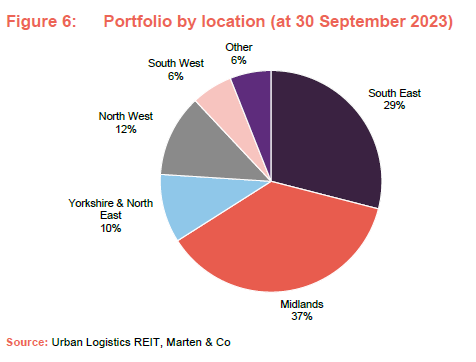
SHED’s adviser says that its immediate focus is on asset recycling. During the six months to the end of September, the company sold two assets for a total of £15m, representing a 3.4% premium to the March book value. The proceeds were used to pay down floating rate debt, bringing the group’s total hedging position to 97% hedged or fixed to term (more detail on SHED’s debt profile is on page 18). The manager anticipates further asset sales over the next six months, where the proceeds will be used to bring its debt book to 100% fixed or hedged to term.
The manager adds that it still has an eye on the investment market, where it is seeing dislocation that could create potential buying opportunities in the future, but remains cautious. Potential acquisitions would need to be earnings and NAV accretive and be assessed against other capital allocation options such as debt repayment and share buy backs.
Over the medium term, the manager says it will look to position the ‘core assets’ at 35% of the portfolio by value, allowing it to realise value in assets where the asset management is complete and value has been created, and reinvest in assets where it can add value through leasing activity.
Tenants
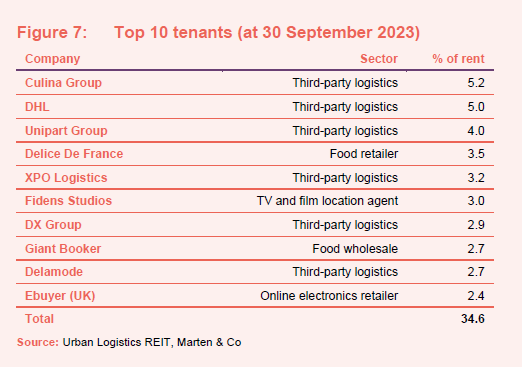
SHED’s top-10 tenants account for 34.6% of its contracted rent and are made up of largely global 3PL operators, as shown in Figure 7. The manager states that a large proportion of the small and medium-sized enterprises (SME) category (23% of portfolio – as shown in Figure 8) is also made up of smaller 3PL companies. ‘Third-party logistics’ refers to the outsourcing of e-commerce logistics processes and includes inventory management, warehousing, and fulfilment. They typically run contracts for e-commerce companies from their sites.
SHED’s largest tenant, Culina Group, is the logistics arm of the Müller Group – the multinational dairy giant. DHL is one of the largest 3PLs in the world – delivering over 1.8bn parcels a year. The Unipart Group runs a contract on behalf of the NHS from its sites. Other top-10 tenants that may not be household names include Fidens Studios, which provides production space for a large US film studio.
In June 2023, a top-10 tenant – Tuffnells, which accounted for 3.3% of annual rent across 12 assets – fell into administration. Within weeks, SHED had assigned eight of the leases to DX Group, with the remaining four assigned to Shift Logistics in September (all on the same terms agreed with Tuffnells). DX Group, which is a London-listed 3PL, has a better credit rating than Tuffnells. The manager says that the speedy resolution reflected the quality of the underlying real estate. The improved credit risk of the occupier meant the portfolio of 12 assets increased in value over the six months to 30 September 2023 by £0.4m.
Figure 8 shows that 82% of tenants across SHED’s portfolio have been rated low/low-moderate risk (as a percentage of contracted rental income) by Dun and Bradstreet (up from 79% on 30 September 2022).
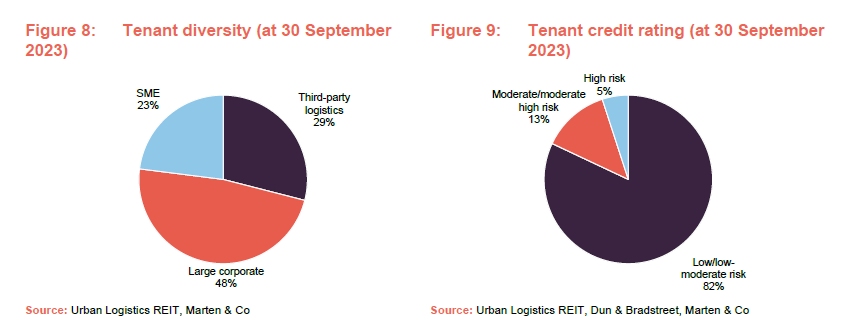
Asset management initiatives
As mentioned previously, more than half of SHED’s portfolio is classified as ‘active asset management’ assets, where the manager can increase rental income over a short period. In the six months to the end of September, the company completed 10 new lettings or rent reviews, generating £1.2m of additional rental income, with a like-for-like rental uplift of 10%.
The majority of activity was focused on letting up vacant space. The portfolio vacancy rate remains relatively high at 6.8% – the majority of which (6.3%) relates to either properties acquired with short leases or vacant (for the purposes of re-letting at improved market rents) or recently completed developments. These assets have an ERV of £3.6m. SHED’s manager says its focus is on realising this reversion, which would feed through to rental growth and earnings.
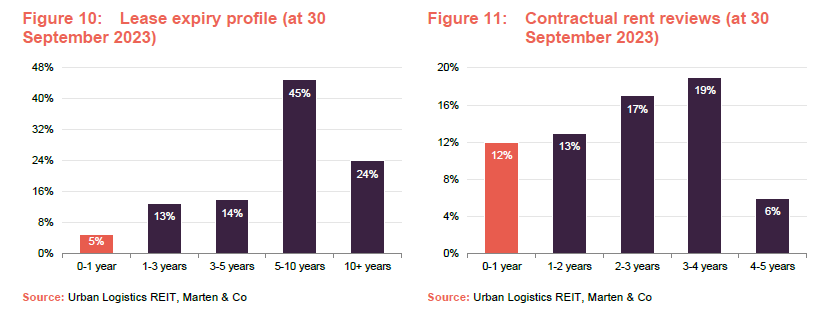
Just under 20% of the portfolio is subject to a rent review or expiry over the 12-month period to September 2024, as shown in Figures 10 and 11, providing the manager with further opportunities to grow rent and in turn capital values.
Being able to grow the valuation of its portfolio through asset management (a large portion of portfolio valuation uplift since inception has been due to asset management initiatives) means that the value of the portfolio was somewhat shielded from higher yields market conditions and valuation falls. This was borne out during the revaluation of property due to higher interest rates. SHED’s portfolio increased in value by 0.2% over the six months to 30 September 2023, due to asset management activities and a 1.4% increase in ERVs.
The company has completed several forward-funded development projects over the last couple of years that have provided a yield on cost of 7.3%. Given the economic picture, with higher interest rates, developments are not currently on the agenda (the company owns development land worth £6m). When development become economical again, the manager plans to turn the development tap on again.
Performance
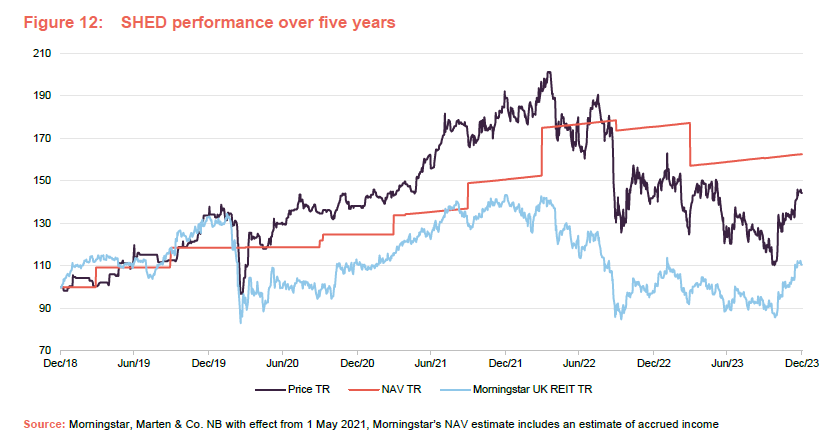
Having increased steeply throughout 2021 and the first half of 2022, SHED’s NAV fell sharply in March 2023 as higher interest rates impacted property yields and valuations. SHED’s focus on growing rents through asset management initiatives offset the worst of valuation declines, and values seem to have now stabilised. In terms of share price performance, the group’s share price has trended up over the past few months as the peak interest rate rhetoric grows on positive inflation data. Over five years, the company’s share price total return comfortably beats that of the Morningstar UK REIT index.
Peer group comparison
SHED has been allocated to the Property – UK Logistics sector by the AIC, a sector that also includes Warehouse REIT and Tritax Big Box REIT. As previously mentioned, there is no other listed company that is exclusively focused on the urban logistics sub-sector and therefore it is difficult to make a like-for-like comparison.
Warehouse REIT’s portfolio is more focused on multi-let industrial assets (which have a completely different tenant base type and is more exposed to SMEs), while Tritax Big Box REIT is focused on the larger end of the logistics market (warehouses in the 500,000 sq ft plus size range), which perform a different role in the supply chain to urban logistics.
We have included other listed property companies focused on the industrial and logistics sector for further comparison. SEGRO is by far the largest and has a mixed portfolio of big box assets, urban logistics and developments. LondonMetric has a big weighting to urban logistics assets, but also owns big box and a separate long-income portfolio.
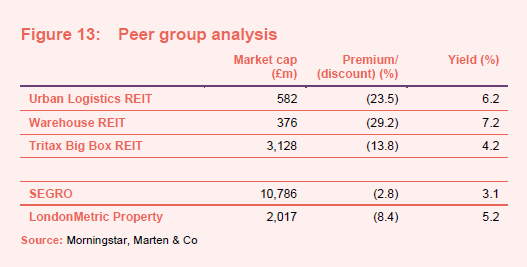

Click here for an up-to-date comparison of SHED and its Property – UK Logistics peer group
SHED’s NAV total return performance is strong compared to its peer group, losing out to just SEGRO over five years and comparable with both SEGRO and LondonMetric over three years. This has not been reflected in its recent share price performance, however. Given that the fundamentals in the logistics sector remain strong (as described in previous sections), the strength of SHED’s tenants, and the manager’s ability to add value through asset management, the company’s discount seems both unjustified and attractive.
NAV and portfolio valuation
SHED publishes its NAV twice a year, based on portfolio valuations, which are approved by the board prior to publication. Independent international real estate consulting firm CBRE performs the valuation, in accordance with Royal Institute of Chartered Surveyors (RICS) guidance. Each property is unique, and the fair value includes subjective selection of assumptions, most significantly the estimated rental value and the yield. These key assumptions are impacted by a number of factors including location, quality and condition of the building, tenant credit rating and lease length. Whilst comparable market transactions can provide valuation evidence, the unique nature of each property means that a key factor in the property valuations are the assumptions made by the valuer.
In October 2019, the European Public Real Estate Association (EPRA) published new best practice recommendations for financial disclosures by public real estate companies and introduced three new measures for reporting net asset value: EPRA net reinstatement value (NRV), EPRA net tangible assets (NTA) and EPRA net disposal value (NDV). SHED considers EPRA NTA to be the most relevant measure for its operating activities and has been adopted as the group’s primary measure of net asset value, replacing previously reported EPRA NAV.
Dividend
In November 2023, SHED declared a first interim dividend for the year to 31 March 2024 of 3.25p per share and said it intends to maintain the dividend for the second half of the financial year at 4.35p, which would bring total dividends for the year to 7.6p – in line with the previous four years.
SHED’s adjusted earnings have not covered the dividend over the last three years, mainly as a result of the impact of capital raising during these years. The company says that it is confident that a dividend at the same level would be covered by earnings next year, through the leasing up of the vacant space in the portfolio (as mentioned earlier) and other asset management activities.
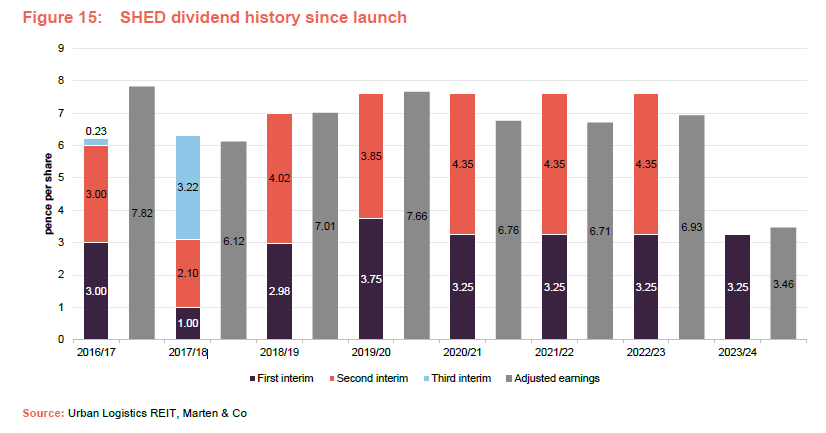
Premium/(discount)
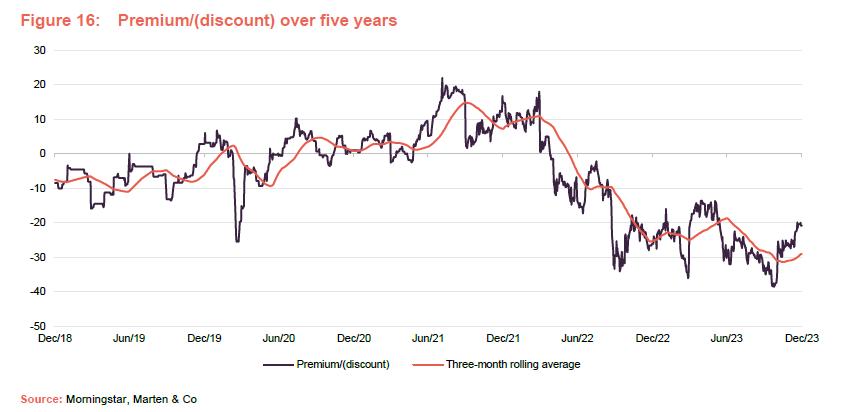
SHED’s shares had been trading at a premium to NAV for more than two years post-pandemic, as the market recognised the strength of its portfolio and the logistics market, but plummeted to a wide discount in 2022 as high inflation and interest rates hit investor sentiment. At 8 January 2024, it was trading at a 23.5% discount, well below its five-year average discount of 6.8%. As mentioned earlier, with interest rates seemingly at peak levels and the reversion potential within the portfolio, a re-rating of its share price is in order.
Fees and costs
As mentioned earlier, new management arrangements came into effect in May 2023, and from May 2024 a new reduced fee structure comes into effect. An annual fee will be calculated as follows: 0.9% of EPRA NTA up to £250m (currently 0.95%); 0.825% up to £500m (currently 0.9%); 0.775% up to £1bn (currently 0.85%); and 0.75% above £1bn (currently 0.85%).
New and reduced management fee
The investment adviser’s appointment is to be extended for a further three years from 12 May 2024 and may be terminated on one year’s notice from 12 May 2026 onwards.
The previous management contract featured a long-term incentive plan (LTIP), which expired without value on 30 September 2023. No payment in cash or equity was made in respect of the LTIP.
Cost ratio
SHED’s EPRA cost ratio was 18.5% at 30 September 2023. This has improved from 21.6% in September 2022 due to the benefit of a full period of income from properties acquired in the prior period. Over the medium term, the company is targeting an EPRA cost ratio of around 15%.
Capital structure and life
SHED has a simple capital structure with a single class of ordinary shares in issue and trades on the main market of the London Stock Exchange. As at 8 January 2024, there were 471,975,411 ordinary shares in issue and no shares in treasury.
Borrowings
SHED borrows money with the aim of enhancing shareholder returns and had total drawn debt of £353.7m at 30 September 2023 and a loan to value (LTV) of 29.3%.
Target LTV of 30% to 40%
The weighted average debt maturity was 6.0 years, and the weighted average cost of debt was 3.86% at 30 September 2023 (an 88 basis points – the equivalent of 0.88% – increase on a year prior). Of the debt facilities, 97% was fixed or hedged.

In July 2023, SHED entered into a £57.3m debt facility with Aviva Investors on a 10-year term at a fixed cost of 6.17%. This facility includes environmental targets that, if met, will reduce the rate. The proceeds of this debt were used to refinance the revolving credit facility (RCF) portion of the Barclays, Santander and Lloyds facility (which at SONIA plus a 2.22% margin, resulted in a total cost of 7.41% at 30 September 2023). The proceeds from the sale of two assets were used to further reduce the drawn portion of the facility to £86.5m.
At 30 September 2023, SHED’s cash balance was £30.9m, of which £4.3m is earmarked for committed capex and £7.5m is in restricted accounts.
Financial calendar
SHED’s year-end is 31 March. The annual results are usually released in June (interims in November) and its AGMs are usually held in July of each year. SHED pays two interim dividends per year in June and December.
Major shareholders
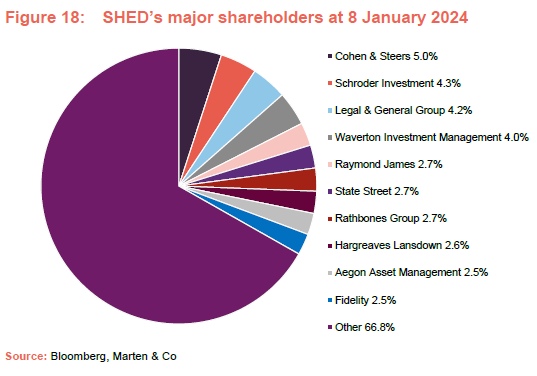
Management team
The manager has an experienced team of investment and asset management specialists, with specific expertise in the logistics property sector. The team has the ability to access off-market transactions in the logistics real estate sector through an extensive and established network across the UK.
Richard Moffitt (chief executive)
Previously an executive director at CBRE, where he was head of the UK industrial team, Richard has over 25 years’ experience of the UK industrial and logistics markets. He has an in-depth understanding of the market’s dynamics, credibility with owners and operators of real estate assets, a thorough understanding of owner and tenant requirements and an extensive network, which includes institutional funds. Richard is a member of the Chartered Institute of Logistics and Transport.
Christopher Turner (property director)
Christopher is a Chartered Surveyor with more than 25 years’ experience in the UK and European investment markets, where he has built up extensive contacts with investors and developers of industrial, office and retail real estate. He has considerable experience in the acquisition, management and disposal of investments through all sectors, focusing on tenant management, covenant performance and active asset management to achieve overall investment returns.
Jamie Waldegrave (chief financial officer)
Jamie has just taken on the role of chief financial officer at SHED, having previously been chief operating officer. He has over 10 years’ experience as chief financial/chief operating officer, most recently at a proptech company offering software to REITs and other property owners. Jamie qualified as a chartered accountant whilst at PwC.
Justin Upton (chief investment officer)
Justin has over 20 years’ experience in the commercial real estate market, including spending 13 years at M&G running their open-ended real estate PAIF which had a peak NAV of £4.9bn and 194 assets. While at M&G he was responsible for £6.5bn of acquisitions and disposals, giving him considerable experience, contacts and understanding of the commercial property markets.
Board
SHED’s board comprises five directors, four of whom are considered to be independent of the investment manager (Richard Moffitt is chief executive of the manager). All directors stand for re-election on an annual basis.

Nigel Rich
Nigel has considerable board experience, having operated across the world in senior positions, most recently at SEGRO Plc. He served as the group chief executive of Trafalgar House Plc from 1994 to 1996 and previously spent 20 years at the Jardine Matheson Group in Asia, serving as a managing director from 1989 to 1994.
Nigel has served as the chairman of the board at Hamptons International, Excel Plc, Xchanging plc and most recently at SEGRO Plc, from October 2006 until April 2016. His other directorships have included Pacific Assets Trust Plc, Granada Plc and ITV Plc. He has also served as a member of The Takeover Panel (UK) and is a Chartered Accountant. Current external appointments include Matheson & Co Ltd and AVI Global Trust Plc.
Heather Hancock
Heather has many years of high-level experience in strategy, governance and leadership gained in the real estate sector and wider economy. She is currently Master of St. John’s College, Cambridge, and was previously chairman of the Food Standards Agency. Heather was executive director of Yorkshire Forward between 2000 and 2003 leading on asset realignment and the assembly of a £350m property portfolio. She then spent a decade at Deloitte’s strategy consulting business, serving as a managing partner from 2008 until her 2014 retirement. Heather is a director of Amerdale Limited, a non-executive director of Rural Solutions Limited and a trustee of the Chatsworth Settlement Trust.
Bruce Anderson
Bruce has considerable real estate and financial services experience, having worked in senior roles at Lloyds, HBoS and Bank of Scotland with 15 years of investment-led boardroom positions. He has experience with both real estate companies and REITs across the UK, Europe and the Far East. At Lloyds he was head of joint ventures for the specialist finance division, responsible for a mixed portfolio of real estate, including both equity and debt elements. Bruce is a Chartered Accountant and currently a non-executive director at Green Property Limited.
Lynda Heywood
Lynda has a wealth of experience as group treasurer at FTSE 100 companies from her 20-year tenure at Kingfisher and six years at Tesco. In her role in the finance leadership team at Tesco, she was responsible for capital structure, liquidity and financial risk management, and was instrumental in delivering the group’s property joint venture acquisitions. She also sat on the investment and risk committee of the Tesco Pension Scheme, which holds a significant real estate portfolio. Lynda is also a member of the money markets committee of the Bank of England and is a qualified Chartered Accountant, a fellow of the Association of Corporate Treasurers and holds a BA in accountancy from the London Metropolitan University.
Previous publications
QuotedData has published four previous notes on SHED. You can read them by clicking the links in the table below or visiting our website.
Figure 20: QuotedData’s previously published notes on SHED
Source: Marten & Co
IMPORTANT INFORMATION
Marten & Co (which is authorised and regulated by the Financial Conduct Authority) was paid to produce this note on Urban Logistics REIT Plc.
This note is for information purposes only and is not intended to encourage the reader to deal in the security or securities mentioned within it.
Marten & Co is not authorised to give advice to retail clients. The research does not have regard to the specific investment objectives financial situation and needs of any specific person who may receive it.
The analysts who prepared this note are not constrained from dealing ahead of it but, in practice, and in accordance with our internal code of good conduct, will refrain from doing so for the period from which they first obtained the information necessary to prepare the note until one month after the note’s publication. Nevertheless, they may have an interest in any of the securities mentioned within this note.
This note has been compiled from publicly available information. This note is not directed at any person in any jurisdiction where (by reason of that person’s nationality, residence or otherwise) the publication or availability of this note is prohibited.
Accuracy of Content: Whilst Marten & Co uses reasonable efforts to obtain information from sources which we believe to be reliable and to ensure that the information in this note is up to date and accurate, we make no representation or warranty that the information contained in this note is accurate, reliable or complete. The information contained in this note is provided by Marten & Co for personal use and information purposes generally. You are solely liable for any use you may make of this information. The information is inherently subject to change without notice and may become outdated. You, therefore, should verify any information obtained from this note before you use it.
No Advice: Nothing contained in this note constitutes or should be construed to constitute investment, legal, tax or other advice.
No Representation or Warranty: No representation, warranty or guarantee of any kind, express or implied is given by Marten & Co in respect of any information contained on this note.
Exclusion of Liability: To the fullest extent allowed by law, Marten & Co shall not be liable for any direct or indirect losses, damages, costs or expenses incurred or suffered by you arising out or in connection with the access to, use of or reliance on any information contained on this note. In no circumstance shall Marten & Co and its employees have any liability for consequential or special damages.
Governing Law and Jurisdiction: These terms and conditions and all matters connected with them, are governed by the laws of England and Wales and shall be subject to the exclusive jurisdiction of the English courts. If you access this note from outside the UK, you are responsible for ensuring compliance with any local laws relating to access.
No information contained in this note shall form the basis of, or be relied upon in connection with, any offer or commitment whatsoever in any jurisdiction.
Investment Performance Information: Please remember that past performance is not necessarily a guide to the future and that the value of shares and the income from them can go down as well as up. Exchange rates may also cause the value of underlying overseas investments to go down as well as up. Marten & Co may write on companies that use gearing in a number of forms that can increase volatility and, in some cases, to a complete loss of an investment.
